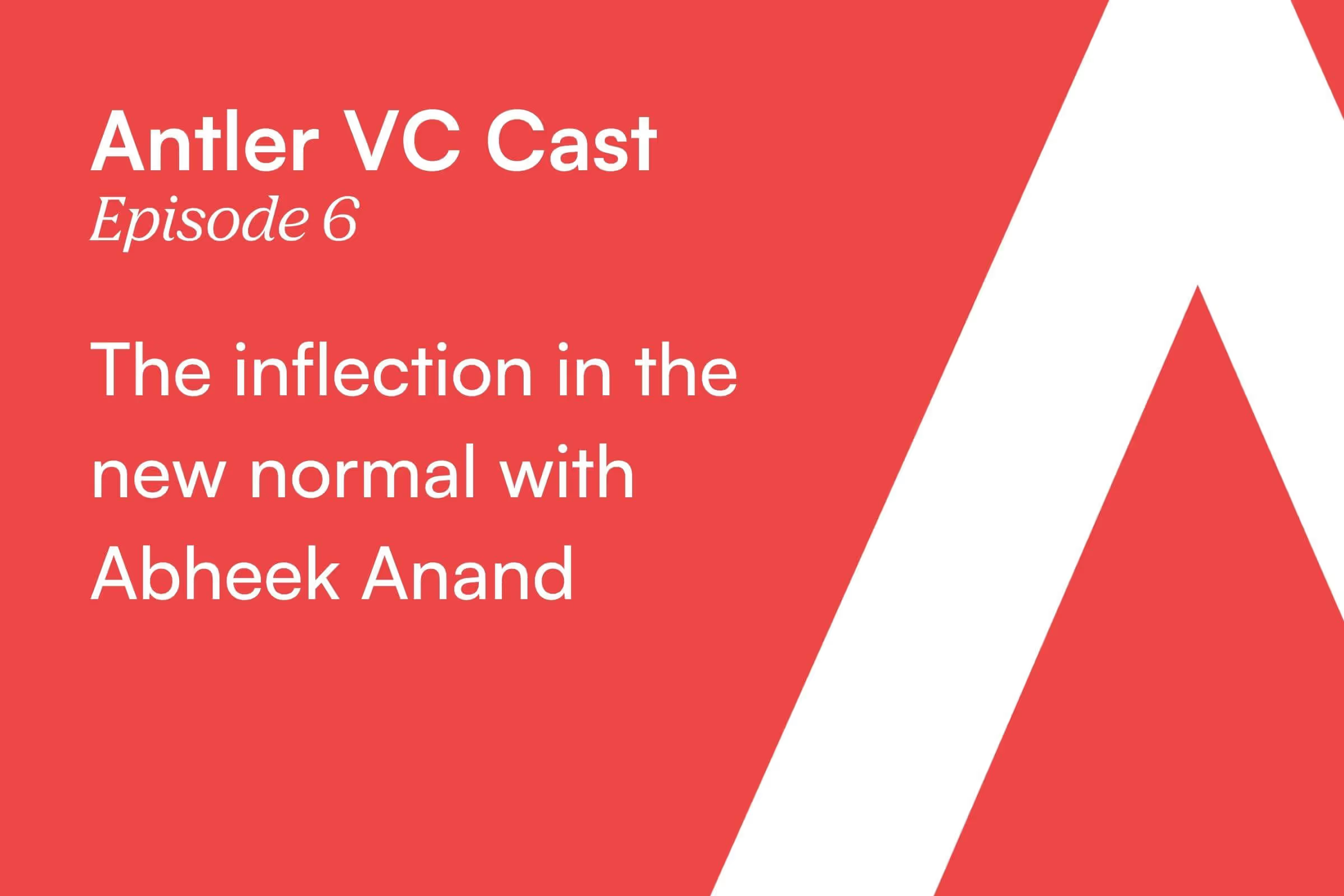We discuss what founders should think about in a post-COVID world, the monumental shift to digital everything and how making fine tweaks to your business model, processes or a certain practice can make a huge difference to the outcome.
Key Highlights From Transcript
[15:40] Abheek explains the shift caused by the inflection points in markets, which he broadly categorises as an accelerated shift from physical to digital.
[22:52] Abheek shares how Sequoia is supporting its portfolio companies by helping them set expectations in the absence of perfect information.
[27:51] Abheek advises the new founders to focus on the very simple question, "why now"? That question is really asking why does my business deserve to exist today but not say five years ago? What's new?
A call for founders to act
Jussi Salovaara: There's been a lot of talk in the market about your letter to your founders and CEOs. Some people have misunderstood it from my point of view to be a very gloomy - now's not the time to build but rather to hunker down. I don't think that was the message at all. The message was to be conservative and be a whole new kind of savvy and hassle in a different way, in a resource-constrained way. I think that's exactly the sort of right way to do it. I've been getting very similar messages through the market and such to our founders, myself. Have you gotten a lot of feedback on that or has that been controversial?
Abheek Anand: No, it's not been as controversial. I think you're right; it was not at all a doom and gloom message. If I had to take one thing away from that, I think the thing that we were trying to impress upon everybody was to have a bias toward action.
I think it's normal for most people in a very rapidly evolving environment to not take proactive action.
The reason for that is a little bit psychological. Most of us or many of us have trained ourselves to act in the presence of somewhat perfect information. We all sort of are trying to solve problems and it's hard to solve problems when the underlying problem itself changes overnight.
So one of the things that we've seen in the past when markets tend to turn, is that founders, in most situations have a very optimistic point of view as they should. They tend to wait to see a ton of cards and wait to see how the environment will evolve. What we've been trying to sort of impress upon people, over the last several weeks is that the worst thing that you can do is not act. It's fine to make small adjustments, small changes to try to anticipate the world and where the world is going. Then adapt when you get more information. But waiting for the perfect amount of information to show up before making the "perfect decision" may not be an option for most people in this market.
The inflection point in the world
Abheek Salovaara: What's been happening over the last years, especially in our markets has been what I would very broadly characterize as a shift from physical to digital. People are slowly shifting from a physical way of conducting business that relied on offline centers for education or direct sales teams for enterprise software. Some kind of physical engagement between the company and its customers towards a more digital world. There hasn't really been, until today, an inflection point on that. I would say it's been more of a gradual shift. People are being educated, a new generation of consumers are coming up. The younger folks are saying "hey, why do I need to do this physical experience when I can experience some things substantially the same digitally?". That shift has been relatively slow.
What has happened is that the curve of that shift overnight has basically moved up vertically.
We've literally gone from a world where it was an option and nice to have a digital experience to cater to a subset of the market. Where worldwide, that's the only experience we have. So it holds true for everything, from education to entertainment. If you're trying to do sales online, that's the only way now that you can conduct sales. So what are some of the better ways for us to do it? If you want to sort of hire somebody and you can't meet them in person, what's the best way for us to do that? What do social interactions now look like in a world where we can't meet in person?
Re-imagining the way we do things
Abheek Salovaara: Now, I think what's going to happen, even in a post-COVID world is one, this transition back to "normalcy" is not going to be overnight.
It's going to be a slow transition back and because of that, the transition from physical to digital is not going back to where it was when it started.
So we'll plateau off at a number that's going to be substantially higher than where it was when we started this transition. So from our perspective, it's sort of important for us to almost try to visualize how one does everything that we were doing in a normal pre-COVID world but do it in a post-COVID world? You can reimagine pretty much everything. How does one find candidates to interview? How do you date somebody? How do you sort of have any kind of interactions with your family? What do social engagements look like? What does entertainment look like? What do sports look like? You can't go into a stadium anymore, there are no concerts for the foreseeable future. I actually think, look, there's going to be a pretty significant humanitarian, social, political, economic cost of this crisis. But the silver lining in that is that the number of opportunities that will emerge to reimagine the way the world exists are going to be very substantial.
Filling the in-person gap
Puja Bharwani: Venture Capital is a very people-oriented business and does require a personal touch to meet a founder in person to get to know them and determine an investment. How are you dealing with not meeting a founder in person and having the first meeting online?
Abheek Salovaara: I would say we're still at a point where a lot of the companies that we are meeting are founders whom we've known from the past. So there's relatively few conversations so far where we're just meeting a company for the first time.
We've actually been pretty actively investing through this period and we've made a few investments recently.
Most of them are people that we've known before. I think what has also happened is that, especially in the early stages of a company's life, it's relatively easy for us to take that risk based on a founder's background, what they've done before, and our conviction in the market. I do think that there are going to be challenges that we have to figure out in terms of how we make larger investments in companies if we haven't met the founder face-to-face. That's something that several people on our team have concerns about. But my personal perspective is that a large part of it is psychological. I can see you guys; you can see me. We are having a conversation that is not very different from the conversation we would have had if we had met in person.
What founders should think about in the post-COVID world
Puja Bharwani: Besides adaptability, would you say there would be a new face of the kind of founder you're looking for in this COVID era? We know founders need to have perseverance, grit and drive to succeed. What would be the one new trait that they really need to have to build a business in this new world?
Abheek Salovaara: I read a quote from one of our partners in the US, who said something to the effect – of "the laws of physics and economics have caught up with the market."
He used the phrase "the laws of physics" because there are some fundamentals about businesses that never really disappear, it's like gravity.
I think what will happen in this environment is that a lot of founders are really going to be tested in a very resource-constrained and rapidly evolving world. That's going to result in a set of founders who are more resilient and more grounded. They are frankly going to be building businesses in a very different way than they would have back in 2019. For example, there have been companies in our portfolio that have literally had to pivot around on a dime as their market no longer exists and they don't expect it to come back anytime soon.
The "why now?" factor
Jussi Salovaara: Is there any advice you want to give to founders or aspiring founders right now, specifically to founders out there right now who are thinking of starting a business, what would it be?
Abheek Salovaara: One of the questions that we ask ourselves at Sequoia for pretty much every new investment that we make is the very simple question: why now? I think this is a very profound question to ask, not just for investors but also for founders. The question is really asking why does my business deserve to exist today but not say five years ago? What's new? If you have a very strong answer for that question, it's a good way to build conviction that what you're trying to build is truly something that can be defensible, that can be large, and is an idea worth pursuing.
So for anybody new who is starting, I would really encourage you to ask that question, why now?
In today's environment, the answer to that question is a lot simpler. You will have lots of markets where the "why now?" is that it didn't make sense for this to exist in January 2020, whereas in April and May 2020, there is no other way for this to exist. This sort of dramatic shift doesn't really happen very often.









%20(1)%20(1).jpg)
%202%20(1).avif)
%20%20(1)%20(1).avif)
